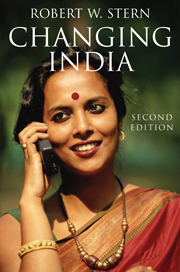Book contents
- Frontmatter
- Contents
- List of maps and tables
- Preface to the second edition
- Glossary
- Introduction: Change, the societies of India and Indian society
- Part I The changing countryside
- 1 Families and villages
- 2 Caste
- 3 Class
- 4 Homelands and states
- Part II Change from above
- Appendix One Major political events in the related histories of British imperialism and Indian nationalism, 1858–1947
- Appendix Two Major political events in the history of the Indian Union, 1947–2002
- Notes
- Guide to further reading
- Index
1 - Families and villages
Published online by Cambridge University Press: 18 April 2011
- Frontmatter
- Contents
- List of maps and tables
- Preface to the second edition
- Glossary
- Introduction: Change, the societies of India and Indian society
- Part I The changing countryside
- 1 Families and villages
- 2 Caste
- 3 Class
- 4 Homelands and states
- Part II Change from above
- Appendix One Major political events in the related histories of British imperialism and Indian nationalism, 1858–1947
- Appendix Two Major political events in the history of the Indian Union, 1947–2002
- Notes
- Guide to further reading
- Index
Summary
Families are the oldest, most prevalent and enduring social institutions everywhere in the world. In Indian villages, families prevail and endure as the basic social institution. Villagers think of their villages as the homes of families. The homes of individuals are in their families. Villages are the basic arenas of cooperation and conflict among families. Families are the constituent units of the larger, inclusive institutions that are described in the chapters that follow.
Families
If in Anna Karenina's first paragraph, Tolstoy had extended his observations from happy and unhappy to ideal families, he might have said of these that they exist in reality nowhere and intrude upon reality everywhere. So it is in India. The basic family unit is, as elsewhere, the household. In the Indian ideal, however, the household is the home not of a nuclear but of an extended family. A family that is both described and idealized as the Hindu or, more accurately, Indian joint or extended family.
Of the ideal Indian joint family, grandfather is the patriarch. Grandmother is his deputy: in charge, particularly, of day-to-day household management, women's and children's affairs, the calming of troubled waters and the smoothing of ruffled feathers. Living under the same roof and taking their food from the same hearth are the couple's married sons and their wives, unmarried sons and daughters, married grandsons and their wives and unmarried grandsons and granddaughters. Children are usually married early.
- Type
- Chapter
- Information
- Changing IndiaBourgeois Revolution on the Subcontinent, pp. 35 - 55Publisher: Cambridge University PressPrint publication year: 2003



